The Daily Observer London Desk: Reporter- Victoria Smith
UK food and drink manufacturers cut prices for the first time in more than three years in June, passing lower production costs down the supply chain, new research suggests.
The ‘factory gate’ prices paid by the likes of wholesalers and retailers fell from the previous month for the first time since February 2020, according to the Lloyds Bank UK Sector Tracker.
Britain’s food and drink manufacturing sector posted a reading of 49.4 on the tracker’s measure of output charges last month, down from 60 in May, where a reading below 50 indicates price reductions.
Food manufacturers were one of the few sectors to lower their selling prices due to improvements in the supply chain last month
The fall in factory gate prices come as food and drink producers enjoyed a second consecutive month of lower input costs, while a further drop in global food commodity prices has also helped.
The Food and Agriculture Organization’s (FAO) price index, which tracks the most traded food commodities around the world such as cereals, dairy and vegetable oils, fell further to 122.3 points in June, having hit its lowest level in two years in May.
Food prices have been rising sharply in the past two years, with some household favourites having almost tripled in price, according to a separate new report by Which?.
The fall in factory gate prices offers some optimism about the rising cost of living, but demand could keep inflation ‘sticky’, according to Lloyds Bank.
Manufacturers of food and drink reported falls in input costs and were one of the few sectors to also lower their selling prices due to improvements in the supply chain.
Only chemicals manufacturers and automobile and auto parts producers also cut their prices in June. Overall, six sectors saw a decrease in input costs.
However, the number of businesses that mentioned raising prices due to strong demand increased in June.
This was particularly the case across the services sector, where the number of firms reporting raising prices due to strong demand was more than 4.5 times relative to the long-run average.
Nikesh Sawjani, senior UK economist at Lloyds Bank, said: ‘June’s data shows that more and more sectors are seeing moderations in cost pressures, which could – if sustained – carry through to falls in prices charged to customers.
‘However, any benefit this has in terms of future inflation trends could be cancelled out by what is clearly still strong demand in some areas of the economy, which could lead to inflation being “stickier” than hoped.
‘This will be a factor that will pose serious consideration for the Bank of England as it continues to deliberate over how much further interest rates need to go in the UK.’
Annabel Finlay, managing director of Food, Drink and Leisure at Lloyds Bank, added: ‘Last month, we saw food and drink producers’ costs drop for the first time since 2016.
‘This has continued into June and may give businesses the confidence and financial foundation they need to start reducing the prices they charge their customers.
‘This could be good news when it comes to the future direction of UK food price inflation. But it will likely be some time before any positive effect is seen on the price consumers pay at the till, and much could still change.
In what are volatile conditions, there’s no guarantee that manufacturers’ input costs will keep falling.’
In May, MPs launched an investigation to determine whether some players in Britain’s food supply chain are ‘unduly’ profiting from surging food prices in a comprehensive ‘farm to fork’ probe.
The Competition Markets Authority is also looking at whether prices are clearly and fairly displayed at supermarkets, alongside its review into ‘greedflation’.



